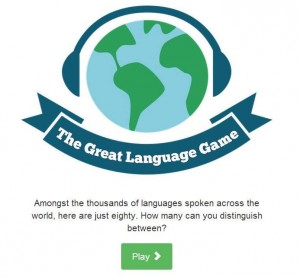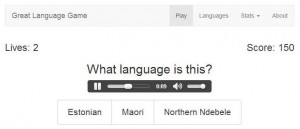As an avid follower, lover and subscriber to Mental Floss, I often find myself scouring their pages for interesting language facts or articles. Their Youtube page (which can be found here) also features frequent videos hosted by John Green, who I find incredibly appealing in all his cool I’m-an-author ways.
In a recent prolonged session of procrastination (whoops), I came across a game devised by data scientist and fellow language-lover, Lars Yencken. Appropriately named ‘The Great Language Game’, it sets out to test your knowledge of 80 world languages by playing short samples of speech and asking for educated guesses as to the language being spoken. At first the game seems easy and you can find yourself getting caught up in the excitement of correctly identifying exotic, previously unknown languages such as Tigrinya and Khmer. Unfortunately, the rounds do get tougher and it inevitably comes to a momentous and upsetting end (which ultimately leads to you restarting the game again and again until you’ve beaten your current high score). However, after a few tries of tuning your ear to these mysterious speech sounds, it seems that not only does following your gut instinct have a profound effect on your inner linguist’s ego, but also that you can begin to identify specific characteristics of the languages such as intonation and rhythm based on your previous trials and triumphs.
I’d like to say that I’ve surpassed my expectations as a great linguist by achieving a score in the thousands, but unfortunately not. Well, not yet, anyway. With more procrastination will undoubtedly come more attempts at beating The Great Language Game, which you can try for yourself here.
PS. I know you’re just dying to find out where Tigrinya and Khmer are from; Tigrinya is an Ethiopian language and Khmer is just a fancier name for Cambodian.


